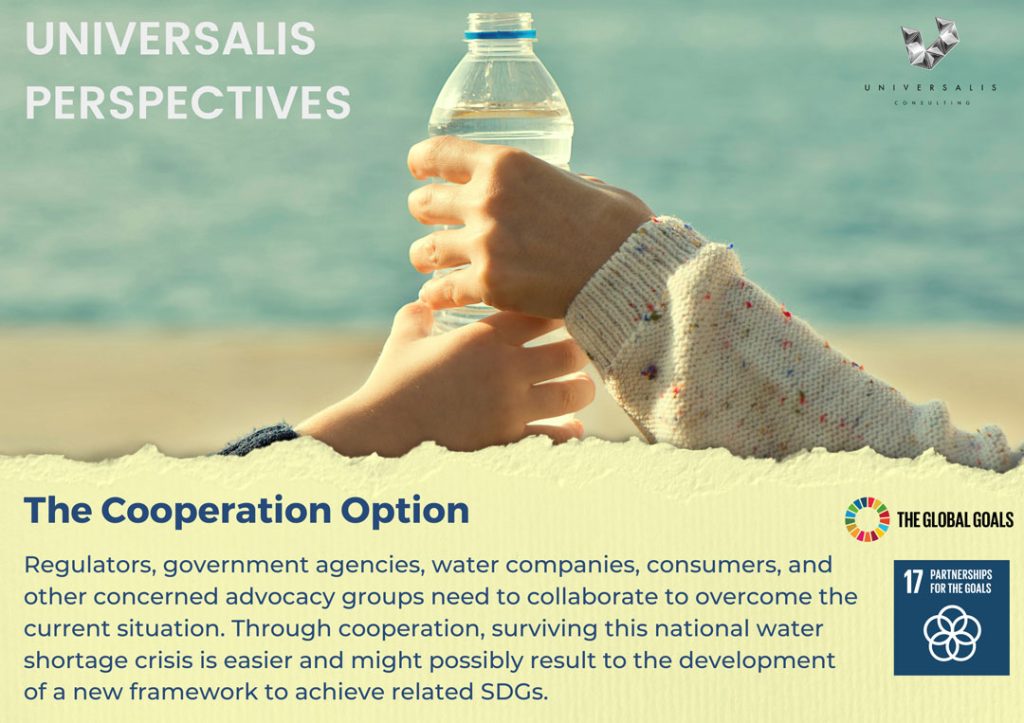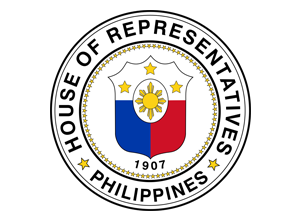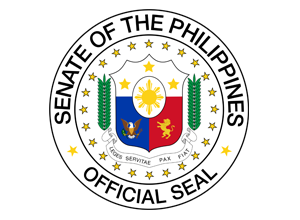Universalis Perspectives: The cooperation option

We have been warned by scientists about climate change and global warming years ago, and the Philippines has been experiencing these changes since the last decade. However, what makes 2023 different from the previous years is the reality that one of the serious effects of global warming and climate change has now reached the household level: water crisis.
Since the start of 2023, water companies in Metro Manila warned about the upcoming prolonged water interruptions during the summer season. In fact, even the MWSS Regulatory Office admitted that a water crisis might occur in 2024 if the situation in the water reservoirs will not improve. What aggravates the situation is the recent alert raised by the Philippine Atmospheric, Geographic, and Astronomical Services Administration (PAGASA) about the 80% probability of El Nino from June 2023 up to the first quarter of 2024.
Fortunately, the water crisis is not beyond the radar of the government. The Philippine Development Plan 2023-2028 released earlier this year acknowledged the linkage between climate change and water shortage problem. In addition, aware of the worsening crisis, President Marcos Jr. issued an executive order creating the Water Resources Management Office aiming to harmonize the efforts of the government and concessionaires to address the water crisis. This serves as a temporary measure while waiting for the legislative branch to pass the bill creating the Department of Water Resources.
The problem of water scarcity is not a problem without solution. In fact, numerous models and references are being provided by multilateral organizations, regional development banks and other progressive stakeholders in addressing the water crisis. However, one unique feature of the water crisis in the Philippines is the frequent tendency to blame the private sector. In fact, this has been the norm for years within the scientific circles: solely blaming the water concessionaires as the reason behind the rotational and seasonal water interruptions.
While water companies do have their share in the blamce, these concessionaires are not the sole reason behind the irritating water shortage problem. Instead of putting the sole blame to these companies, water concessionaires should not be marginalized in the discussions in addressing water shortage problems and other climate-related crises and emergencies. In fact, the private sector must be empowered and incentivized. Why? It is because the private sector has the capital needed to devise new technologies, projects, and programs as solutions to the climate crisis. Instead of focusing our energies on antagonizing and demonizing the private sector, why not take advantage of their resources to formulate strategies to address the climate crisis?
We need to affirm that collaboration is the best option. We can only survive this water crisis, now being a national crisis, through collective efforts coming from the government, private sector, civil society, and international organizations.
Let us look at the case of Thailand – another Southeast Asian country located in the tropics which is also expected to experience the severe effects of climate change. As a tropical country, Thailand is also prone to encounter water shortage problems due to increasing temperature. Similar to the Philippines, Thailand is also blessed by major rivers and tributary streams throughout its territory. What makes Thailand different from the Philippines lies on the harnessed and harmonized waterways connection in the country present in canals and other passageways. In addition, Thailand separates itself from the Philippines in addressing climate-induced water shortage problem through a collective approach between government agencies, multilateral organizations (e.g. UN Development Programme and Asian Development Bank), and universities. In order to emerge victorious from this water shortage problem, the Philippines needs to harmonize the relationships between public and private stakeholders through resource sharing, technical cooperation, and coordinated execution.
The Philippines is not helpless in addressing the water crisis. In fact, the Philippines is one of the countries with best environmental laws. We also have the necessary legal and policy tools to motivate business to become leaders in environmental protection, especially the incentives given to companies developing and implementing green projects as well as those who create the so-called “green jobs”. Maybe, a proper and intensified implementation of these laws and policies is what’s needed to reduce the animosity between the government and business community?
Lastly, we need to bear in mind that cooperation between public and private stakeholders is a must and aligned to the Sustainable Development Goals, especially SDG 17 or Partnership for the Goals. If regulators, government agencies, water companies, consumers, and other concerned advocacy groups will collaborate, surviving this national water shortage crisis is easier and might possibly result to the development of a framework or model on how countries in the developing world can weather the impacts of climate change-induced shortages and disasters.


